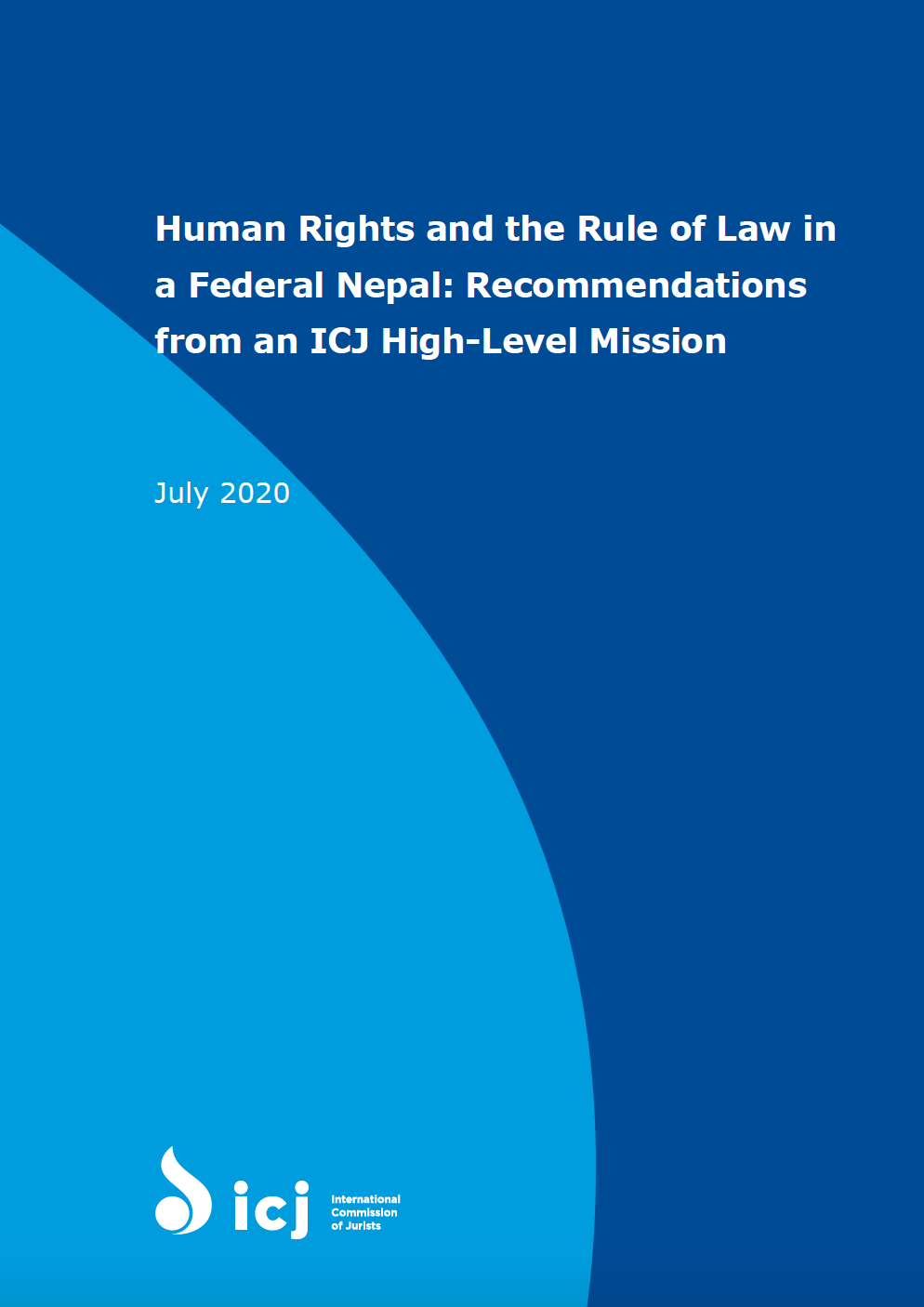In a report published today, the ICJ called on the Government of Nepal to undertake substantial reforms in order to ensure that the wide-ranging constitutional and political restructuring of recent years will allow the country to deliver on human rights accountability and access to justice for all Nepalis.
The Report on Human Rights and the Rule of Law in a Federal Nepal incorporates the findings of a High-Level Mission undertaken by the ICJ in December 2019.
The Report offers more than 50 recommendations, including that the Nepali authorities act to remove obstacles to access to justice for those seeking a remedy and reparation for human rights violations and abuses, both from the conflict era and contemporary times. The ICJ also called upon the authorities to end political interference in the enforcement of the law and administration of justice, including in respect to directives from the courts and the National Human Rights Commission.
“In the face of the challenges of federal decentralization, it is vital that all Nepalis are able to trust in their fair and equal treatment under the law,” said ICJ Commissioner and former Nepal Supreme Court Justice Kalyan Shrestha. “This report is a guide to how that public trust can be strengthened in Nepal.”
The ICJ Mission found that despite strides in the development of human rights law, policy and jurisprudence, many long-standing obstacles to accountability and access to justice persisted and remained largely unaddressed.
“Nepal remains caught in a cycle of impunity that threatens to undermine the rule of law, as evidenced by a stalled transitional justice process, compromised justice sector institutions, a fragmented civil society, and the persistence of systemic discrimination,” said ICJ Commissioner Dame Silvia Cartwright. “Despite notable efforts by provincial policymakers, a robust judiciary and the relentless advocacy of civil society, authorities representing the ‘new’ Nepal are in danger of repeating the mistakes of the past in failing to truly listen and respond to the demands of Nepalis for justice.”
The Report considers the human rights impacts of recent changes in the political and legal context, such as the implementation of provisions of the 2015 Constitution that operationalize elements of a new federal system of governance, long-awaited amendments to the Penal Code and other laws affecting the criminal justice system, and a lack of progress in the transitional justice process, as well as the de-stabilizing effects of recent political developments and COVID19.
The Mission was undertaken by ICJ Commissioners Justice Sanji Monageng (Botswana), Dame Silvia Cartwright (New Zealand) and Justice Kalyan Shrestha (Nepal), as well as ICJ Legal and Policy Director Ian Seiderman and ICJ Asia-Pacific Director Frederick Rawski.
The Report, building on a 2017 ICJ baseline study, offers findings in three main areas:
- Non-Implementation. Nepal has made notable strides in the progressive development of law and jurisprudence that incorporates significant elements of the international human rights law framework, such as the fundamental rights provisions of the 2015 Constitution. However, constitutional mandates, legislation and judicial decisions have in many cases gone unimplemented or been actively undermined at the expense of public trust in government, and access to justice for victims.
- Independent and Impartial Institutions. Nepal has made progress in establishing and building the capacity of justice institutions including police, prosecutors, the judiciary, transitional justice mechanisms and national human rights bodies. However, these institutions suffer from weaknesses in capacity and independence, and are vulnerable to political influence and manipulation.
- Accountability and Access to Justice. Despite improvements in the law and progress in institution-building, Nepalis still face the same barriers to accessing the justice system. Frontline institutions, particularly the police and prosecutors, lack the political will and capacity to effectively interface with communities. Individual Nepalis, especially those from ethnic minority communities or without proof of citizenship, typically face overwhelming obstacles when pursing a remedy in the courts.
Safeguarding the independence of the judiciary was a central theme of the Mission. The Mission found that the Supreme Court continues to effectively carry out its responsibilities under Nepal’s constitution and international law to protect human rights. However, it also concluded that persistent non-implementation of judicial decisions constituted a serious abdication of responsibility on the part of the executive authorities.
“The Mission was impressed by the role that the judiciary, and particularly the Supreme Court, has played in protecting human rights,” said ICJ Commissioner Justice Sanji Monageng. “However, we repeatedly heard concerns that officials routinely ignore judicial decisions – to such a degree that non-implementation threatens to diminish the credibility of the judiciary in the eyes of the public.”
The Mission found that the failure to respect judicial decisions was exacerbated by political interference in the appointment processes of key institutions, such as the Supreme Court, Nepal Police, National Human Rights Commission and transitional justice bodies. Among its recommendations, the report calls for the adoption of more fair and transparent appointment processes, and other measures to prevent political interference in the application of the law.
“Political interference in the appointments of high public officials erodes public trust, degrades the effectiveness of governance, and creates conditions for corruption,” added Justice Shrestha. “This includes the current system of judicial appointments, which is vulnerable to political influence, and must be reformed.”
Drawing on these findings and observations, the report offers extensive recommendations directed to the Office of the Prime Minister, federal and provincial legislatures, the Nepal Police, the Office of the Attorney General, the judiciary including the Supreme Court and National Judicial Academy, the National Human Rights Commission, civil society and the diplomatic community.
Download
Human Rights and the Rule of Law in a Federal Nepal: Recommendations from an ICJ High-Level Mission in English and Nepali.
Executive Summary and Recommendations in Nepali.
Contact
Frederick Rawski, ICJ Asia-Pacific Director, e: frederick.rawski(a)icj.org
Ian Seiderman: ICJ Legal and Policy Director, e: ian.seiderman(a)icj.org
Mandira Sharma: ICJ Senior Legal Adviser, e: mandira.sharma(a)icj.org

